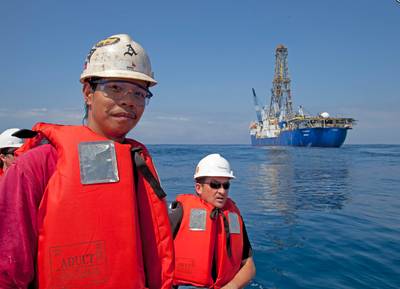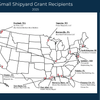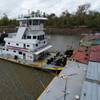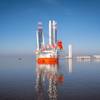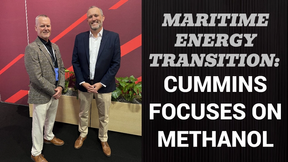Scientists Drill Atlantic for Climate Change Clues
Ocean drilling expedition retrieves multi- million-year cores from the North Atlantic off Newfoundland.
Researchers on board the scientific ocean drilling vessel JOIDES Resolution recently completed an expedition to the North Atlantic, near the coast of Newfoundland, Canada. Here, near the final resting place of the ill-fated RMS Titanic, large sediment drifts contain detailed records of the Paleogene – a span of about 40 million years when Earth’s climate shifted from a sultry “hothouse” to a cooler climate, featuring the first polar ice sheets.
The expedition succeeded in retrieving sediment cores and data from several famous events, including the Paleocene-Eocene Thermal Maximum (PETM), the Cretaceous/Paleogene (K/Pg) boundary, and the Eocene-Oligocene boundary.
The time intervals and events captured by the expedition, known formally as Integrated Ocean Drilling Program (IODP) Expedition 342 (Paleogene Newfoundland Sediment Drifts), constitute a “greatest hits” of paleoclimate. The findings have the potential to inform scientists about the implications of modern, human-induced climate change.
“A principal goal of the expedition was to study potential past analogs to future global change,” says Expedition Co-Chief Richard Norris of the Scripps Institution of Oceanography.
“We can measure the amount of carbon dioxide in the atmosphere today, and we can measure the amount of carbon dioxide in the atmosphere in the past. The trillion dollar question is: what is climate sensitivity?” says Expedition Co-Chief Paul Wilson of the University of Southampton, UK. “What we mean by climate sensitivity is, for a given carbon dioxide forcing, how much will global temperatures respond? And that is the question we are seeking to address with our expedition.”
In the picture L-R: Allen Cortez (Siem Offshore) and Dan Brinkhuis (videographer, ScienceMedia, The Netherlands) take a spin around the JOIDES Resolution in the Z-boat to shoot video footage for the expedition documentary.



